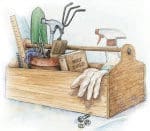Stuff!!
To provide for laundering and night wear, every monk will need two cowls and two tunics, but anything more must be taken away as superfluous. RB 55.10-11
Ever feel like you have too much stuff?
The wake-up call started once again when John and I decided to have the cork floor in the TV room taken up and replaced with hardwood flooring. Why not pull up the carpeting in the adjacent dining room and living room, too? Then we can sand and stain the floors in all three rooms. While we’re at it, remove the carpeting on the stairs and in the hallway and sand and stain these, too. Look! The walls have gotten a tad dingy and the white molding is scuffed up! Let’s paint the three rooms and the entry foyer and the hall and the closets. After all it’s been over 18 years.
A grand idea until we began to move things out of the TV room, the dining room, living room and the closets. Where am I going to put the pile of books that has resided on the living room floor since January? The china has to be stored safely. How? Pack the nick-knacks on my mother’s wall shelf and remove EVERYTHING from three closets. Where DID all this stuff come from and how are we going to fit it into the guest room?? Can we put the linens in our suitcases? Yes! Wait! No! We’re both going away in a couple weeks before the painting is done. Angst sets in, leaping to mind in the middle of the night and sneaking into my morning prayer.
Does ANY of this sound familiar to you? Too much stuff – physical stuff let alone the mental “stuff’ that crowds our tired minds.
Please know that John and I are not extravagant, nor are we collectors of this or that or even hoarders (except for my books – that doesn’t count, right?), but it was clear to me that the Benedictine prescription for moderation had flown the coop!
What does Benedict offer that can help us stay the weeping and gnashing of teeth?
First, Benedict is clear about the dangers of private possessions.
Above all, this evil practice [private ownership] must be uprooted and removed from the monastery. RB 33.1
But Benedict does not expect us to live in want. The abbot or prioress of the monastery is to “provide all things necessary” (RB 55.18). There are legitimate needs. But he prescribes providing only what is needed, instructing that “anything more must be taken away as superfluous.” (RB 55.11)
(hmmm…Do I really need that summer skirt I bought last week?)
Next, the “item-in-item-out” approach is mandated.
“When new articles are received, the worn ones—sandals or anything old—must be returned.” (RB 55.12)
(How many vases from flowers have I accumulated in the linen closet??)
“Whenever new clothing is received, the old should be returned at once and stored in a wardrobe for the poor.” (RB 55:9)
(If I keep that new skirt, what should I give away?)
Last on the list, Benedict recognizes that monitoring is needed. He instructs that beds are to be inspected frequently by the abbot or prioress “lest private possession be found there.” (RB 55.16) I know that I can easily justify a purchase or keep something I may not really need. ( I’m packing these up now.) But who is to inspect my closets, bookshelves, the chest in the dining room, etc? Does self-inspection count…or even work??
In the booklet “Living Simply” that I wrote for the Notes from a Monastery series by Abbey Press I addressed this dilemma of possessions and offered a reflection:
“In the Benedictine life, what is most important is central, what is necessary is provided, and whatever would distract or encumber is let go. Take an audit of your possessions. What do you really need? What could you let go of? Take an audit of your heart—learn to distinguish between want and need. Focus on what is really important.”
Having a calm mind and heart to do my work is important to me. Piles, clutter, stuff create instant frazzle. What is really important to you that possessions can undermine or be a distraction?
Benedict provides us with some soaring benchmarks that can remind us to moderate our own predispositions. It is this very moderation, however, that can help us towards a more balanced life, a life that honors what is really important. And to support this quest we can use the three practices from the Rule: 1) live by need instead of want, 2) practice “item-in-item-out”, and 3) reflect on our progress towards freedom from acquisition.
Woefully I don’t pretend to excel in this area at all. But I promise to ponder the problem and offer a tool to help us all take even baby steps toward moderation and simplicity. But right now I’m going up to the linen closet and tackle the mess of rags, weights, cleaning supplies, etc. Only God’s infinite wisdom knows what else I’ll find there!
Blessings,
Jane
Email Jane with your thoughts and comments
See a Tool for Small Steps Toward Freedom from Stuff here
© June 2012 The Rev. Dr. Jane A. Tomaine

